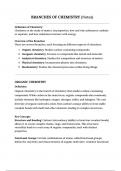BRANCHES OF CHEMISTRY (Notes)
Definition of Chemistry:
Chemistry is the study of matter, its properties, how and why substances combine
or separate, and how substances interact with energy.
Overview of the Branches:
There are several branches, each focusing on different aspects of chemistry:
1. Organic chemistry: Studies carbon-containing compounds.
2. Inorganic chemistry: Focuses on compounds like metals and minerals.
3. Analytical chemistry: Studies the composition and structure of matter.
4. Physical chemistry: Incorporates physics into chemistry.
5. Biochemistry: Studies the chemical processes within living things.
ORGANIC CHEMISTRY
Definition
Organic chemistry is the branch of chemistry that studies carbon-containing
compounds. While carbon is the main focus, organic compounds also commonly
include elements like hydrogen, oxygen, nitrogen, sulfur, and halogens. The vast
diversity of organic molecules arises from carbon's unique ability to form stable
covalent bonds with itself and other elements, leading to complex structures.
Key Concepts
Structure and Bonding: Carbon's tetravalency (ability to form four covalent bonds)
allows it to create complex chains, rings, and frameworks. This structural
versatility leads to a vast array of organic compounds, each with distinct
properties.
Functional Groups: Certain combinations of atoms, called functional groups,
define the reactivity and characteristics of organic molecules. Common functional
, groups include hydroxyl (-OH), carbonyl (C=O), carboxyl (-COOH), and amino
(-NH₂) groups.
Reaction Mechanisms: Organic chemistry investigates how and why organic
molecules undergo specific reactions, such as substitution, addition, elimination,
and rearrangement. These mechanisms help predict outcomes and guide the
synthesis of complex compounds.
Applications
Pharmaceuticals: Organic chemistry is crucial in designing and producing drugs,
where understanding molecular structure and reactivity guides the development
of safe and effective medications.
Polymers and Plastics: The creation of synthetic materials like plastics and fibers
is largely based on organic chemistry. Polymers, which are large molecules formed
by repeating units, are essential for many everyday products.
Biological Molecules: Organic chemistry overlaps with biochemistry, as organic
molecules form the foundation of life. Proteins, carbohydrates, lipids, and nucleic
acids are all organic compounds.
Examples
Methane (CH₄), ethanol (C₂H₅OH), and glucose (C₆H₁₂O₆) illustrate the range of
organic molecules, from simple hydrocarbons to complex biomolecules.
INORGANIC CHEMISTRY
Definition
Inorganic chemistry focuses on the study of compounds that do not primarily
contain carbon-hydrogen bonds. This branch encompasses metals, minerals, and
other non-organic materials, as well as some organometallic compounds (which
have metal-carbon bonds).




